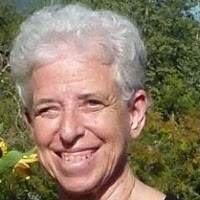Merrill Joan Gerber is the author of the new essay collection Revelation at the Food Bank. Her many other books include the novel The Victory Gardens of Brooklyn, and her work has appeared in a variety of publications, including The New Yorker.
Q: Over how long a period did you write the essays in your new collection?
A: It surprises me now that 24 years passed between writing my first essay in the book (“The Lost Airman”—the story of my cousin’s plane shot down by Japanese Zeros during World War II) and my most recent essay, “Revelation at the Food Bank” (the book's first and titular piece).
I was not thinking during those years that I would write a collection of essays—it was just one tale at a time that I wanted to tell.
Q: How was the book’s title (as you mentioned, also the title of the first essay) chosen, and what does it signify for you?
A: “Revelation” was the title of the last short story Flannery O’Connor published in the 1964 issue of The Sewanee Review—the same edition in which I published my first short story early in my career.
I was captivated by the idea of what the word revelation might mean—especially when I wrote my book’s title essay—a long discussion of a thousand subjects considering love and marriage, old age and death, the pandemic, cancer, jealousy, suicide, and the meaning of life.
When my essay, “Revelation at the Food Bank” was accepted for publication by The Sewanee Review, I was overjoyed at the idea that *my* revelation piece would be in the same journal that Flannery O’Connor’s story appeared. I was made even happier when my essay was selected to be in Best American Essays 2023!
Q: The writer Judy Blume said of the book, “Written from her deepest truths, these intimate essays can be heartbreaking, maybe because we see ourselves in each of them. But they are told with such humor, such delicacy, that we close the book sighing, Yes, this is life!” What do you think of that description?
A: Judy Blume and I were born one month apart in 1938, and one state apart (she in New Jersey and I in Brooklyn, New York).
We were teenagers in the same kind of worlds, both from Jewish families, and both growing up in a time when certain subjects were forbidden to discuss—specifically our mysterious coming of age as young women with many questions about our own sexuality and our changing bodies.
Judy and I met one another when we were grown women and became close friends. Her comment about my book, “Yes, this is life!” is exactly right—we both made our discoveries over many years, and were always seeking to understand what “life was.”
Q: How did you choose the order in which the essays would appear in the collection?
A: I arranged the essays in order of their publication, which seemed appropriate—in that my discoveries along the way matured as I lived longer and could engage with different subjects that caught my attention.
The final essay (and title essay of the collection) was indeed a summary of the various revelations that came to me over the years.
Q: What are you working on now?
A: I began my career as a fiction writer, and over time I tended to enjoy writing more “from my own mouth.” Of course, all fiction writing comes from a source of personal knowledge and invention. I’m thinking about my next piece of work—but it won’t be fiction.
Q: Anything else we should know?
A: I am grateful to have had my 31st book published with Sagging Meniscus Press and its wonderful publisher Jacob Smullyan.
This was also the year that Yale Beinecke Rare Books Library collected further materials for my literary archive there.
--Interview with Deborah Kalb

.jpeg)
Yes, you're right about Judy Blume: I once met her but without having read her books. But I saw the film Are you there, God? It's me, Margaret and it seemed so familiar to me. Both you and she mirror ordinary lives, a pure, clear reflection.
ReplyDelete